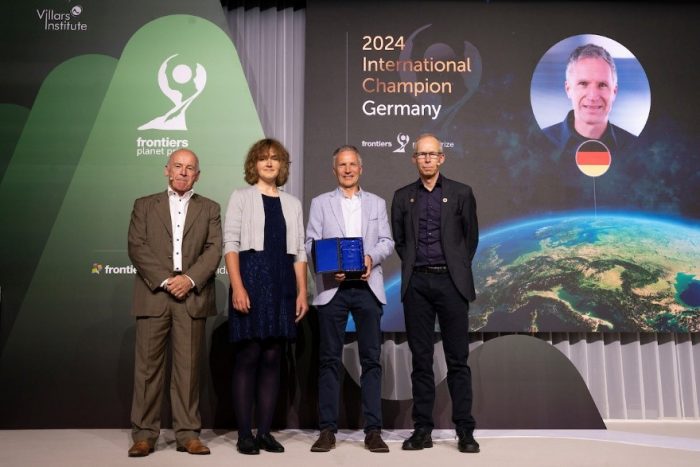Smithsonian scientist wins prestigious Frontiers Planet Prize
Smithsonian’s National Zoo and Conservation Biology Institute community ecologist Ellen Welti was recognized by the Frontiers Research Foundation for her work on the halted recovery of European freshwater biodiversity, alongside her co-author Peter Haase of the Senckenberg Society for Nature Research. Their paper received the Switzerland-based organization’s prestigious Frontiers Planet Prize, winning at both the national and international level April 22 and June 26, respectively.

Center left, Ellen Welti (Smithsonian National Zoo and Conservation Biology Institute) and Peter Haase (Senckenberg Society for Nature Research) accept the international Frontiers Planet Prize in Villars-sur-Ollon, Switzerland. Photo credit: Frontiers Research Foundation
June 26, 2024
Freshwater ecosystems, such as rivers, lakes, ponds and streams, are crucial for life on Earth. They support an estimated 10% of all known animal species, including one-third of vertebrate taxa, globally. However, environmental degradation of freshwater ecosystems from human activity has resulted in disproportionally high biodiversity losses. Major ongoing threats to freshwater systems include nutrient and chemical inputs from runoff and aerosols, climate change and alterations to the physical shape of flowing waters such as the construction of dams and channelization. Welti and Haase’s work highlights the need for further legislative action, such as improved wastewater treatment and reduced pesticide use to not only protect biodiversity, but to mitigate risks of flooding and drought.
“This work demonstrates both a message of hope and warning,” Welti said. “Prior legislation to improve water and air quality has led to improved habitats and biodiversity recovery, but those benefits are reaching their limit and new initiatives are needed.”
Welti and Haase focused on identifying how freshwater biodiversity has changed during this period of accelerated human impacts and the extent to which the reduction of some stressors but increase of others have driven these changes. Water-quality monitoring that includes sampling of freshwater macroinvertebrate communities was adopted across Europe, but major challenges exist in synthesizing data to inform management actions. Initial challenges include a lack of long-term biodiversity-monitoring data, particularly before 2000, and a lack of a unified network of scientists across the continent sharing and comparing data to infer large-scale ecological responses.
To overcome these issues and provide insights into how mitigation policies and stressors have shaped freshwater biodiversity, the research team analyzed continent-wide long-term data sets to document and track changes in the abundance and diversity of macroinvertebrates over time. This unprecedented resolution in terms of sampled areas and time periods allowed Welti and Haase to examine detailed quantification of the trajectories of biodiversity trends at a continental scale. Their research showed mitigation measures did improve water quality, leading to a partial recovery of freshwater biodiversity. Unfortunately, improvements in freshwater communities leveled off around 2010 and remain below European Union ecological quality targets. Welti and Haase call for additional measures such as legislative regulation to reduce pesticide application and water consumption, further improve wastewater treatment plants and restore free-flowing rivers with connected floodplains.
About the Frontiers Planet Prize
Launched by the Frontiers Research Foundation on Earth Day 2022, the Frontiers Planet Prize aims to mobilize science for a global green renaissance. The prize is endorsed by the International Science Council in its efforts to accelerate the most impactful scientific solutions. Now in its second year, the prize has engaged 475 leading universities and research institutions across six continents and 20 national academies of science.
Posted: 6 August 2024
-
Categories:
Kudos , News & Announcements , Science and Nature , Zoo & Conservation Biology Institute



